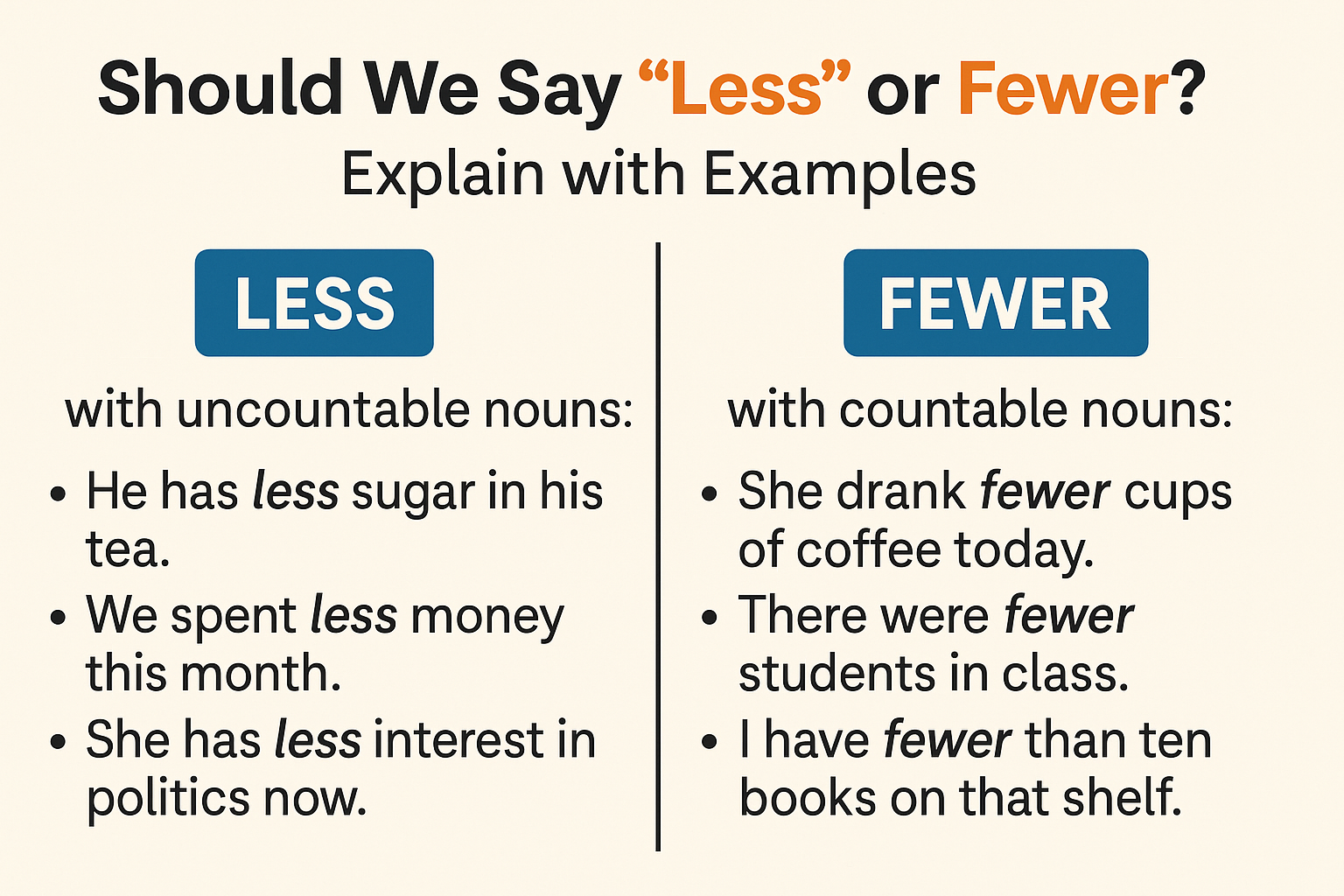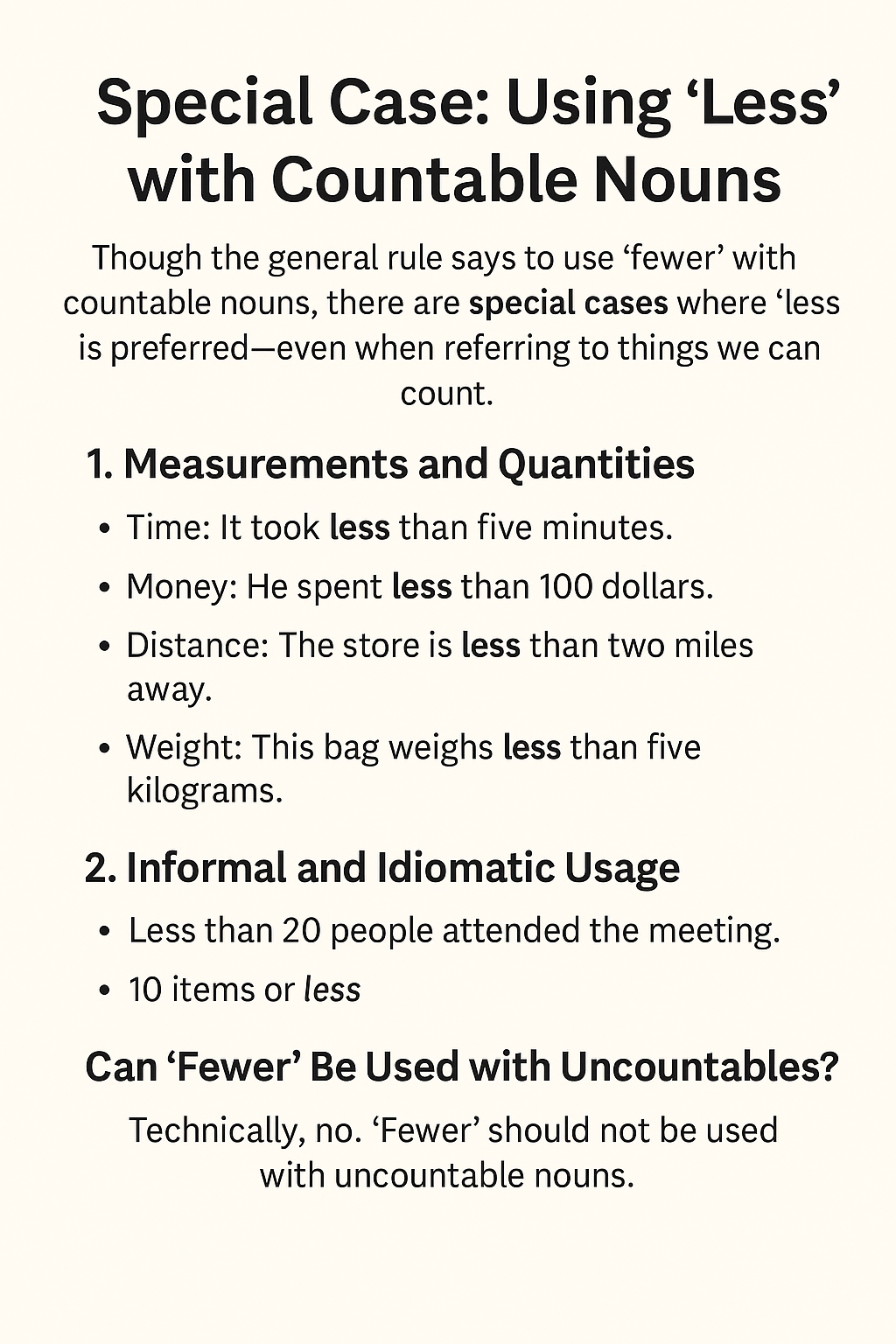Less or Fewer ?-Grammar Puzzle Solved-46
One of the most common confusions in English is choosing between “less” and “fewer.” Though they seem interchangeable, the less or fewer grammar rule depends on whether a noun is countable or uncountable.
The Basic Rule
Use “fewer” for countable nouns—things you can count individually.
Use “less” for uncountable nouns—things measured in bulk or amount.
Use “Fewer” with Countable Nouns:
- She drank fewer cups of coffee today.
- There were fewer students in class.
- I have fewer than ten books on that shelf.
In all these cases, we can count cups, students, and books. So, “fewer” is correct.
Use “Less” with Uncountable Nouns:
- He has less sugar in his tea.
- We spent less money this month.
- She has less interest in politics now.
Here, “sugar,” “money,” and “interest” are uncountable, so “less” is correct.
Common Exception
We use “less” with time, distance, money, and weight, even though they can be measured:
- The journey took less than two hours.
- He earns less than $500 a week.
- This bag weighs less than five kilograms.
These are accepted idiomatic uses, despite referring to quantities we can count or measure.
Final Tip
To master the less or fewer grammar rule, always start by asking a simple question: Can I count it? If the answer is yes, the correct word is “fewer.” If not, then “less” is appropriate. This guideline applies to most everyday situations and helps prevent common grammar errors. While certain exceptions—such as time, money, and distance—do exist, they are few and generally accepted in modern usage. Understanding the difference becomes easier with regular practice. Therefore, when in doubt, try replacing the noun with a number. If it fits naturally, use “fewer.” If not, choose “less.” Reading well-edited writing, solving grammar puzzles, and testing yourself with examples will strengthen your grasp of this rule. With time, the right choice will become automatic.

🔹 Special Case: Using “Less” with Countable Nouns
Though the general rule says to use “fewer” with countable nouns, there are special cases where “less” is preferred—even when referring to things we can count.
1. Measurements and Quantities
We commonly use “less” with nouns that are technically countable but function as units of measure. These include:
- Time:
It took less than five minutes. - Money:
He spent less than 100 dollars. - Distance:
The store is less than two miles away. - Weight:
This bag weighs less than five kilograms.
Even though “minutes,” “dollars,” “miles,” and “kilograms” are countable, they act like collective amounts, so “less” is correct and natural.
2. Informal and Idiomatic Usage
In everyday conversation and signs, “less” is often used with countables:
- Less than 20 people attended the meeting.
- 10 items or less (commonly seen in supermarkets)
While grammarians might prefer “fewer,” these uses are so widespread that they are accepted in informal and commercial English.
Can “Fewer” Be Used with Uncountables?
Technically, no. “Fewer” should not be used with uncountable nouns.
However, in poetic, creative, or rhetorical writing, someone might break the rule for style:
- There was fewer joy in his voice.
This is incorrect in formal grammar but may appear in literature or speech for emphasis. Still, such cases are rare and not recommended for academic or professional use.
In short, the less or fewer grammar rule has clear boundaries, but usage evolves. Context and tone often guide whether the exception is acceptable.

Subject-Verb Agreement:
https://grammarpuzzlesolved.englishlitnotes.com/subject-verb-agreement-complete-rule/
Background and Summary of Cleanness by the Pearl Poet: https://englishlitnotes.com/2025/07/09/background-summary-of-cleanness/
For grammar lessons, visit ChatGPT to explore the platform and interact with the AI: https://chat.openai.com
Discover more from Grammar Puzzle Solved by Naeem Ullah Butt
Subscribe to get the latest posts sent to your email.